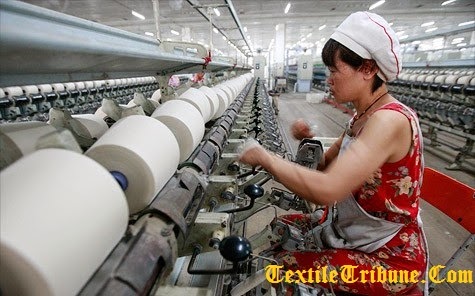Textile Industry of China Looking for Africa for Better Production
Nitu Islam
International Islamic University Chittagong
International Reporter of Textile Tribune
Email: nitu.nitu07@gmail.com
International Islamic University Chittagong
International Reporter of Textile Tribune
Email: nitu.nitu07@gmail.com
It is noted that, increasing labour expenses, raw materials and slowdown has been staring at textile industry in China so fastly in present situation. China is so interested for moving and expanded their products. The most pursued location to relocate is Africa captivation for companies in terms of costs and market rate.
Today’s in China industry, wage have gone up U$600 on an average and almost 23 million textile workers have to paid that amount . As a labour-intensive industry, garment makers faces heavy and tough pressure on soaring expense of labour in China. The growing rate of minimum amount is 10 percent per annum. Industry can not able to recruit a skilled worker by offering minimum wage.
 |
| Textile Industry of China |
Moreover, price of high-quality cotton in China is so high, comparatively to International market rate which is the most prominent reason of fiber processing dropping by 26 percent in last year.
Major garment makers are welcomed these challenges and they have followed some strategies like recruiting low cost labour from Africa or Southeast Asia, or continuing in China to produce premium value added products.
In case of first strategy, from seven African countries including Nigeria, Ghana and Tanzania has reportedly hired about 2600 African workers in 1992 by Yuemei Group.The Chairman of Yuemei Group, Xu Zhiming gives an assurance and told that "Africa will definitely be the manufacturing center of the world in the future.
African countries are very glad for getting investments from China. Specially, Morocco is one which is directly focused in Chinese capital and technology.In order to enhanching the six major industries in 2009, Morocco made a fantastic industrial development plan which would fruitful and arresting for foreign investor. Most of the Morocco are designed such a technology way so that they could earn foreign exchange of about Euro 4 billion ( US$.95billion) every year. Their most of the products are fast fashion or ready to wear garment which is perfectly fit for exporting to Europe or the USA.
According to Mohamed Tazi, Director, Moroccan Association of Textile and Apparel Industries, Chinese garment producers can look to gain better access to European, African and other markets if they set up factories in Morocco. They can take advantage of the country's strategic position at the crossroads of the main trade routes linking Africa and Europe, as well as its free trade agreements with the United States, the EU, Turkey, Jordan, Tunisia and West Africa.
Some textile majors opted the second option. They opined that China's textile industry is yet to approach its sunset, and instead of relocating, have planned major expansion. For example, Esquel Group, Hong Kong-based garment-maker established in 1978, has plans to invest Yuan 2 billion (US$325 million) to set up a new factory in Guilin, Guangxi Zhuang region. Esquel runs a complete value chain - cotton growing, spinning, weaving, dyeing, sewing, and retailing. It is the largest cotton shirt maker in the world in terms of output. John Cheh, Vice-chairman and CEO, Esquel, believes that rising wages mean improved skills, higher efficiency and improved consumption power among Chinese people.
Aaron Lee, chief operating officer of Esquel, thinks of optimizing the process and adding value than of chasing after cheap labor. Esquel makes only high-end shirts for international brands like Zara, Ralph Lauren, Tommy Hilfiger, Nike and Muji, as well as some high-end domestic brands in China, so the margin is higher than in making simple T-shirts.
Over the years, China has transformed from manufacturing cheap garments to a major supplier for international brands, so being in the country also means being close to the most dynamic market. The fast changing consumer taste in China means brands have to keep innovating by creating new designs and new functions, which raises new requirements for garment manufacturers.
Wang of the textile council suggests companies innovate more with new materials so they are able to come up with more functional materials. Textiles is the only industry in which China has a strong advantage over its competitors across the world, and that is a very good reason to keep it alive believes Wan
Source: yarnsandfibers dot com







0 comments:
Post a Comment